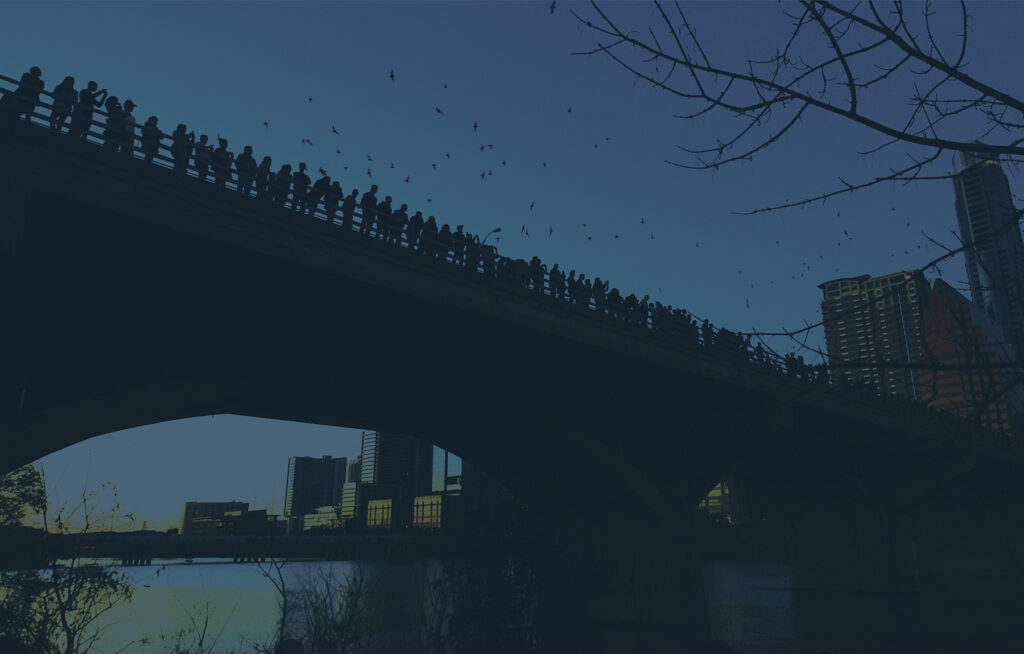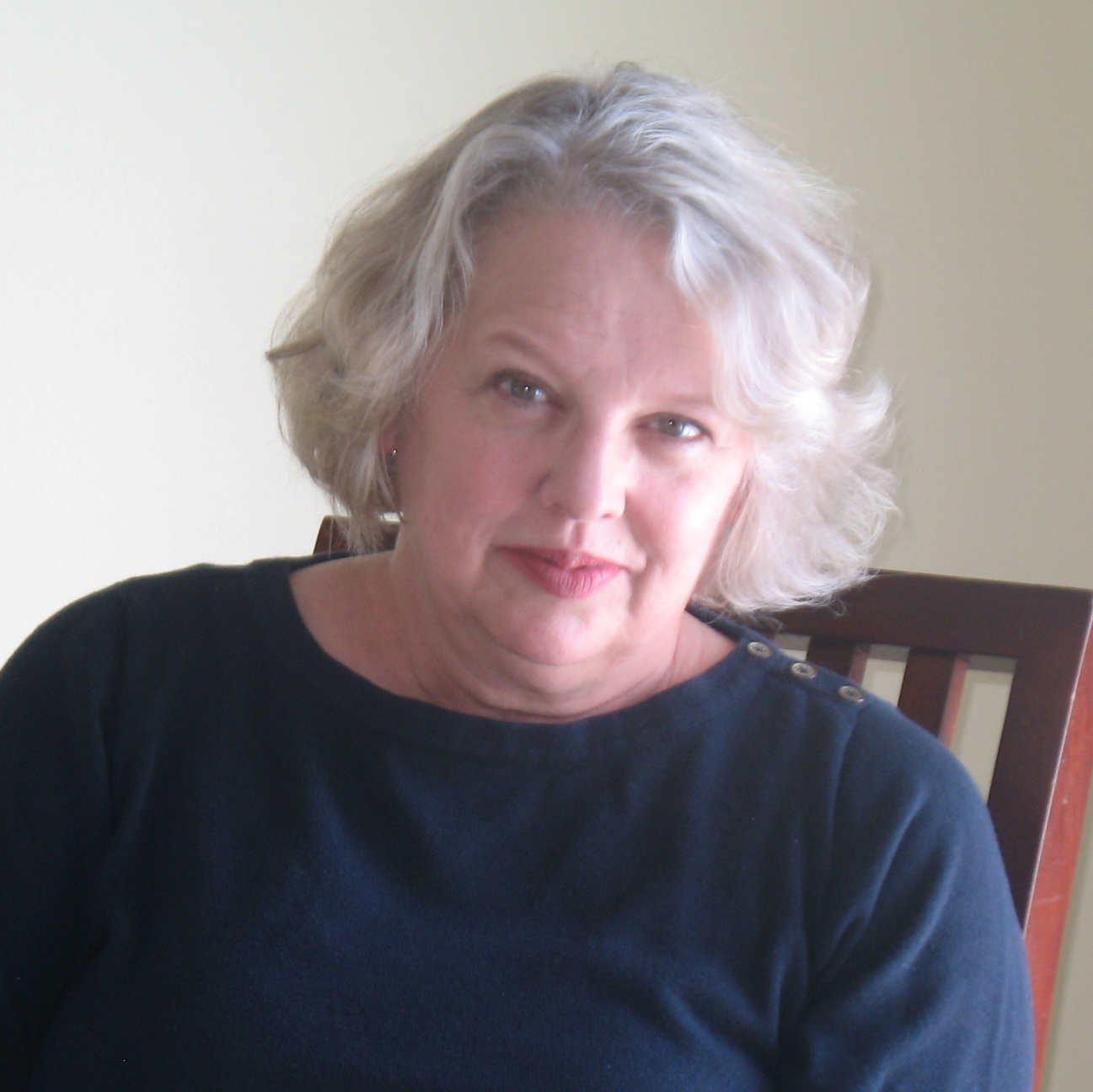Selina Yancey gazed through her office window. Across the snowy parking lot, two white poplars on the edge of the woods behind the meetinghouse had caught her eye. The smaller tree, bent during a recent ice storm, leaned against the larger tree at a point some eight feet above the ground, forming a rough arch. Selina pulled on her parka. The echoing emptiness indoors couldn’t compete with such a clear invitation.
The poplar archway led into a dimmer twilight. The silence was like the quiet of open worship—a soaring quiet with an understory of low murmuring sounds: breath, shuffling, the creak of a pew, and occasionally the voice of a Friend sharing a thought. Among the hollies, briars, and tangled brush of the woods, the quiet held the murmuring and shuffling of squirrels, soft bird calls, and wind-stirred snow dropping from branches.
Selina drew a deep breath in the cold, silvered-mirror stillness, filling her lungs with ice-blue air, air so cold she thought it might turn to snow inside her. She exhaled through her mouth. Holy Spirit, breathe on me. A burst of vapor hung in the air in front of her, as if she stood before an invisible glass made visible by her breath, then gone. Why must it always go?
After Sunday’s service, Selina met with the trustees to request a leave of absence for two weeks in March. “A sabbatical,” she explained, “a chance to recharge and prepare for the Easter season.”
“We understand.” Mrs. Logan, eldest of the three elders, patted Selina’s right arm. “We want you to take care of yourself.” She tried to look into Selina’s face, but Selina was studying her shoes. Only her round, vulnerable chin was visible beyond a curtain of pale, wavy hair.
A second trustee patted her left arm, and told her to take all the time she needed. “Do you have something special planned?”
Selina pulled herself together and raised her head. “I plan to fly down to Texas.”
The trustees would imagine she had friends or family in Texas. She didn’t. Texas was home to Agustín, a mixed-media artist. Selina had discovered him through a coffee-table book titled Open Sky in the waiting room of her father’s oncologist. Agustín created grand representations of an apparently limitless, dreamy southwestern sky. Selina had lost herself in the photographs of his works while waiting for the next round of bad news from the doctor. A major exhibit of Agustín’s work was currently on display in Dallas, and smaller pieces hung in the capitol in Austin. Seeing them in person would surely inspire and inspirit her, restore her equilibrium.
She had packed all the wrong clothes. The concrete and glass canyons of downtown Dallas held the March wind and sent it knifing down Selina’s neck. She shivered in the isolation of being far from home, further estranged from friends she’d neglected during her father’s illness and in the months following his death. A phase of disconnection was probably normal before starting a new path; she prayed Agustín’s art would help her find a trailhead.
After two days surrounded by enormous canvases, she admitted defeat. Even in person the art offered no toehold to climb to the openness of the skies, as the photographs in the book had suggested. Selina blamed herself. Not even the actual southwestern sky reflected in the mirrored towers of downtown inspired her. She doubted Austin would be any improvement, but she stuck to her itinerary and flew there as planned.
Outside baggage claim, Selina climbed into the next cab in line, pulling her bag behind her. Rita, the driver, nodded confidently at the name of her hotel and pulled away from the airport with a grand swoop. Once on the highway, traffic to central Austin came to a standstill.
“Sorry for the delay,” Rita said. She waved a hand at the construction barriers and orange barrels. “It’s always like this.”
“Must get tedious,” Selina said. The scenery was certainly depressing: a one-lane tunnel through concrete and menacing machinery.
“Oh, the people I drive keep things interesting.” Rita thought about this, then added, “One time I got a call to drive an elderly lady, Pauline, to a town in Arkansas. Said she needed to withdraw money from a few banks before her daughter took it. So I invited my husband and son along, you know, as an outing. Rory was five and hadn’t been to Arkansas.”
“Well, we crossed the state line and got to the town—I forget the name—and Pauline directed me from bank to bank. We’d wait in the car while she went in, and she’d come out stuffing an envelope in her ‘ginormous’ grandma purse. Third stop my husband said, ‘You don’t reckon she’s robbing banks?’
“How we laughed! Then Pauline gets back in the car, says she’s done. We started back to Austin, and bam.” Rita popped the steering wheel with her palm. “Police cars, lights flashing. I pulled into a Quik Stop and they surrounded us. Guns drawn, the whole nine yards.”
“Good heavens.”
“Right? One cop says my cab is suspected in a kidnapping. Pauline says, ‘Oh, foot, my daughter must’ve called.’ She rolls down the back window and says, ‘I’m no more kidnapped than this little boy, here,’ and Rory’s sitting in his car seat, got his hands in the air to surrender. Tickles me when I think back on it.”
“What happened then?”
“Not much.” The construction zone ended, and Rita merged into the open left lane. “The daughter showed up and took Pauline to her house. We drove back to Austin. Good old Pauline. She paid in cash and gave Rory ten dollars for riding shotgun with her. He won’t forget that day in a hurry.”
“Whew. What an adventure.” Lulled to peaceful contentment by the comfortable backseat and the relief of Rita’s happy ending, Selina closed her eyes and relished the surrender of being driven. There was much to be said for not having to stay alert and make decisions. She remembered nights as a child riding half-asleep in the backseat while her parents talked softly up front. As her dad rounded curves and made turns from street to street, she’d try to divine how close they were to home.
Might a taxi service have a place in her ministry? She could drive congregants in silence to offer them a brief, blissful escape, or listen as they told their stories. Maybe Mrs. Logan would drive when Selina needed a turn in the backseat.
The cab reached the hotel, snapping Selina from her reverie.
Rita deftly processed Selina’s credit card payment and said, “Enjoy your stay! Be sure to go down to Congress Bridge at sunset to see the bats fly. It’s a spectacle.”
Ordinarily Selina wouldn’t seek out bats, but the next evening she sat on a crowded dock by the water waiting for them to appear. The sky was gray as newsprint with sponge-dabbed clouds. The bats emerged at first in such gentle arcs she felt underwhelmed. Then a dark mass of bats flowed across the sky in a mighty swarm, appearing like jumbled letters and punctuation marks against the newsprint sky. Selina craned her neck to read the messages, but the letters scattered until the growing darkness erased them completely.
Selina skipped the capitol building and spent her days exploring Austin on foot. She relaxed in the loosely casual atmosphere, where music spilled onto the sidewalks. She visited all the thrift stores and tried on the prettiest tooled leather boots she’d ever seen: bone-colored with teal accents. Where in the world would she wear fancy cowgirl boots?
Every day at sunset she walked to the bridge to see the bats.

Selina’s return flight to North Carolina landed early, before the airport had fully awakened. She took a shuttle to long-term parking and braced herself for a long drive home. If only Rita were here with her cab and a story. Never mind. Selina chose to avoid the interstate and take a leisurely route through rural areas.
In the town of Crescent, she spotted a coffee shop and turned beside it onto a street of mixed residential and commercial properties. Selina pulled to the curb in front of a large, tree-shaded lot with a tumbledown rail fence.
She stepped onto the sidewalk, carefully circumventing a section of concrete buckled by the force of oak roots. A voice, surprisingly close, said, “Good morning.”
The lot wasn’t empty; it was the backyard of a faded-blue frame cottage. An elderly Black man stood on the other side of the fence, holding a level against the top rail. He laughed when Selina jumped. “Didn’t mean to scare you.”
“I didn’t see you there. Good morning.”
Like his house and yard, the man was worn thin. Tall but a little stooped, he bent his knees to squint at the level, mumbling, “Shoulda brought my glasses.”
“Can I help?” Selina asked.
“This spirit level is about to beat me; my eyesight’s so bad. Tell me where the bubble is.”
She bent and examined the level. “The rail needs to come down a bit on this side. Yep. Right there.”
The man patted the rail and drove a nail underneath to secure it. “I’ll straighten out this ramshackle fence yet. Now, that’s some mighty fine boots you have on there.”
Selina grinned. “Thank you.” Sneaking a peek at her feet, she still couldn’t believe she owned them.
“I got no cattle, but maybe you can help me wrangle some hens.” The man tipped his head toward a shed tucked between the fence and an overgrown rhododendron. A low hum of clucking and chirring came from inside. “Sun’s well up, and these hens still abed!”
They both looked down at the small door through which the hens could come and go.
“Hatch rises at sun-up, closes at dusk. But those hens won’t come out. Now why, you reckon?”
“Do they sense a threat out here?”
“Can’t nothing get ’em while I’m close. So why they keep in the dark? Two steps and there’s fresh air, food, and water ready.” He shook his head. “Bird brains. I reckon overnight they forget how it works; forget when the morning light comes, the door’s open and food’s waiting.”
Selina felt a melting at her core, something like the peaceful surrender she’d felt in Rita’s cab. “I think we all forget sometimes.” She patted the rail. “Have a good day.”
He waved. Selina walked to the diner and ordered two cups of coffee to go. The hen keeper’s face lit up when she handed one over the fence to him.
“Well, aren’t you nice? Thank you kindly.” He’d acquired a pair of reading glasses, perched on the end of his nose. He nearly lost them as he jerked his head sideways and said, “Looka there!”
Two hens had ventured from the coop to peck beneath the rhododendrons.
Selina raised her cup in a salute. “They figured it out!”
“Mm-hm. Took their time, but the time did come.”
Ten miles or so from home, Selina became aware of the jonquils, daffodils, and redbuds that had begun blooming during her two-week absence. The jonquils in her yard should be blooming too. Only a handful of turns on familiar streets remained before her sabbatical officially ended.
After bumping slowly across a double row of railroad tracks, Selina stopped at the bottom of a hill and signaled a left turn. A glance in the rearview mirror gave her a shock; a vast pale wall loomed behind her.
The morning sky filled the mirror, blank as newsprint.
Not blank. A puff of cloud drifted into frame, a soft exhalation of visible breath. Selina watched as the cloud dissolved. Her turn signal continued marking the seconds with a steady pulse, but she remained perfectly still, remembering.





Evocative and timeless… love this line, “Only a handful of turns on familiar streets remained before her sabbatical officially ended.” As a whole, the story evokes the deep, unspoken places we can find ourselves, that look “blank as newsprint” viewed in the rear-view.